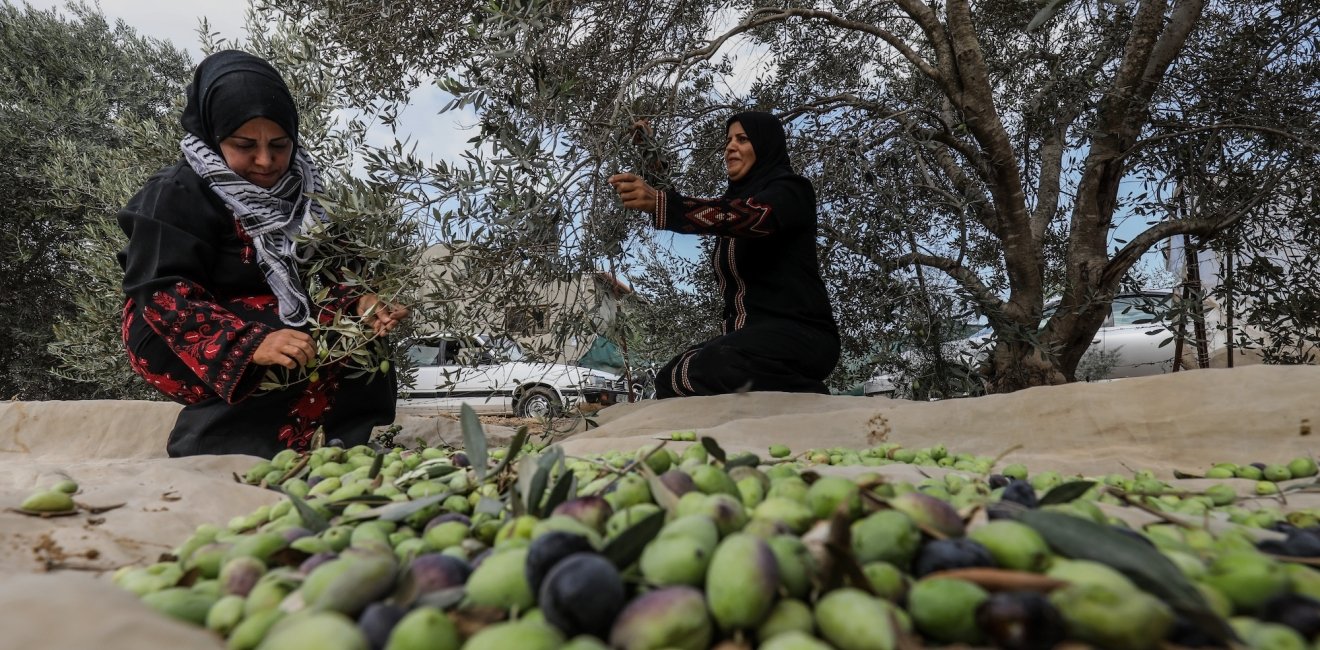
A blog of the Middle East Women's Initiative
The events of 2023 have not only highlighted gendered concerns in the region’s top political and economic struggles but also its very centrality.
Enheduanna editor, Faria Nasruddin, reviews the status of and major developments for women in the Middle East and North Africa, as well as gender policy on the international stage and its regional implications. The year 2023 was marked by important advancements in gender policy in workforce developments and climate solutions yet saw a deterioration of conditions for women and girls in Iran, Afghanistan, and the Palestinian Territories. Looking to 2024, the needs of women and girls will need to be taken into account in policymaking circles. A feminist foreign policy that calls for a human-centered approach to security and, as UN Deputy Secretary General Amina Mohammed said, “a shift of mindset away from confrontation and toward dialogue, engagement [and] cooperation” could facilitate stable and sustainable peace and prosperity in the region.
Female workforce participation initiatives
The Middle East & North Africa has one of the lowest rates of female labor force participation globally. The latest estimate from the World Bank shows that only 19 percent of women over the age of 15 in MENA participate in the workforce. Within the region, however, there is a wide spectrum, with countries like Bahrain, Kuwait, Qatar, the UAE, and Israel well over the average at or around 50 percent, while countries like Algeria, Egypt, Iran, Iraq, Jordan, Syria and Palestine significantly below the mean. MEP’s report “Women Entrepreneurship in MENA,” published March 2023, defined key barriers women face in the private sector: mismatched education and skill-building, difficult legal environments and the persistence of discriminatory laws in practice, unsafe and inaccessible transportation, the uneven transition to the digital economy, and socio-cultural mindsets about the roles and capabilities of women. While this year has seen success in initiatives like the Oasis program in Jordan and Syria that provides childcare services, cash-for-work, and skill development to women—with a particular focus on women with disabilities—challenges are still abundant in a rapidly shifting economy.
- STEM Enables Women’s Economic Empowerment in the MENA Region
- Lebanon Has a Chance to Rebuild a Private Sector Centered on Women
Gender mainstreaming at COP28
The UNFCCC’s COP28 was held in Dubai, UAE, in December 2023; the second consecutive year the climate conference has taken place in the MENA region. The previous conference in Sharm El-Sheikh, Egypt, was largely criticized for underrepresenting women in negotiations. By contrast, COP28 was marked by the announcement of the Gender Responsive Just Transition & Climate Action Partnership convened by Emirati ministers and supported by the UNFCCC. Sixty-eight countries have signed onto the commitment to improve gender and environmental data to enhance financing to the most impacted regions and to generate opportunities for those most affected by the climate crisis. The International Labor Organization states that 1.2 billion jobs—the majority held by women—are at risk due to the climate crisis. The partnership aims to support women as the global economy transitions to a low-carbon and sustainable model. The second round of review will be in three years, during COP31.
- Green Building Addresses Energy Crisis in Iraq
- Women at the Forefront of Environmental Protection in Oman
Women remain under stifling repression in Taliban-ruled Afghanistan
This year, the UN reported that Afghanistan was the most repressive country in the world for women and girls. Since the Taliban took over the government in August 2021, they have initiated a series of increasingly harsh restrictions on women’s participation in education and the workforce, as well as freedom of movement and dress. The regime of gender apartheid is compounded by the severe humanitarian crisis worsened by a prolonged drought and a series of 6.3-magnitude earthquakes which struck the northwestern province of Herat in October 2023. A rapid gender analysis by the Gender in Humanitarian Action Working Group in November 2023 revealed that an estimated 29.2 million people in Afghanistan need urgent humanitarian aid to survive, 15.3 million people are affected by food insecurity, and 25% of the population does not have access to basic health services. The effects on women and girls—especially those in female-headed households—are significant and range from increased risk of forced and early marriage to mental health challenges and malnutrition, perpetuating cycles of poverty and dependency in the long term. Moreover, earlier this year, the government of Pakistan issued a decree for all undocumented refugees from Afghanistan to return to their country of origin. Since the decree went into effect, 400,000 people have returned to Afghanistan (80% of whom are women and children). The conditions in Afghanistan that drove emigration persist and restrictions on women increase by the day with no sign of change from the Taliban, pressure or engagement from the international community, or long-term plan to support the rights and freedoms of Afghan women and girls.
The first anniversary of “Zan. Zendegi. Azadi!”
September 16th marked the first anniversary of 22-year-old Kurdish-Iranian woman Mahsa Amini’s death at the hands of Iran’s morality police and subsequent protests that rocked Iranian society. Throughout the year, the resilience of the Iranian women was on full display: 20% of women are reported to be defying the mandatory hijab laws, and jailed activists like Nargess Mohammadi—who received the 2023 Nobel Peace Prize—smuggle letters out of prisons and continue their defiance through hunger strikes. Although organized diaspora groups like the Alliance for Freedom and Democracy in Iran (AFDI) splintered and the Iranian regime has cracked down on protestors by issuing increasingly stricter edicts on the hijab and by using new surveillance technology, the “Zan, Zendegi, Azadi!” or “Woman, Life, Freedom” movement’s spirit continues with widespread support for and respect for women’s rights at its core.
- For Iranian Women, a Bittersweet Celebration
- Hijab, See-Through Clothing, and Exercises in Futility
- Nobel Peace Prize Shines a Light on Iranian Women's Resilience: The Nargess Mohammadi Story
- Iran: Violence Against Women
Gender-based violence in the Israel-Hamas War
The October 7th Hamas attack on Israel spurred a new stage in the 70-year Israel-Palestine conflict and was marked by unprecedented levels of gender-based violence against civilian populations. Eyewitness reports and investigations on the weaponization of sexual violence show seven different locations where Hamas fighters committed sexual and gender-based violence. In Gaza, women and children have borne the brunt of Israel’s military campaign, comprising over 2/3 of those reported to have been killed in the war (12,882 total as of January 2, 2024). Moreover, women (and children) are disproportionately affected , by the going humanitarian crisis and the 2,784 newly formed female-headed households face challenges finding and accessing food, water, shelter, and medical care; 50,000 pregnant women have precarious access to medical care amid displacement and infrastructure collapse. Additionally, video footage and photos issued by the IDF showcased how Israeli forces are deploying gendered tactics of violence against Gazan civilians, like stripping and detaining civilian men, designed to further the humiliation of Palestinians in the strip. Examining how gender-based violence is deployed as a tactic of war and seeking accountability and justice for survivors on all fronts in the wake of conflict will be one step only in the larger process of de-escalation.
- Unraveling the Multi-Faceted Impact of Armed Conflict on Women in the Gaza Strip
- The Precedent of October 7th in the Israeli-Palestinian Conflict: Systemic Gender and Sexual-Based Violence
- Palestinian and Israeli Women Speak: Regaining Humanity at a Time of Violence
Looking forward to 2024: Towards a Feminist Foreign Policy
The events of 2023 have not only highlighted gendered concerns in the region’s top political and economic struggles but also its very centrality. If progress toward a more stable and prosperous region is to be made, then gender must be at the top of policymakers’ agendas for the coming year. It is worth highlighting two issue areas in particular with far-reaching implications on regional security and prosperity:
With the digital transformation taking root, it is imperative that women are not left behind. There is already a significant gender divide in access to, use of, and experience with technology. As technology like AI develops, it is being deployed as another mechanism to facilitate gender-based violence and repression, like in Iran. Yet, further technological advances will impact spaces where women typically face barriers to entry, like the economy and civil society. With more data from the MENA region on women’s experiences to inform regulations and programs on using these new third spaces, its potential to empower, rather than harm, women can be harnessed.
Escalation across the MENA region in Israel, the Palestinian Territories, as well as by Iran and its proxies leads to questions about what the “day after” will look like in these contexts, but it is evident that when it does occur, de-escalation and rebuilding will take the form of gradual stages. As a result, centering the response on the needs of women and girls should happen now rather than down the line. Arguably more complex than physical or material reconstruction is the interpersonal healing that will need to take place for communities to learn to trust, cooperate, and engage with each other — in this, women are crucial agents of change. Addressing how women and girls have been impacted by conflict and including them in the post-conflict reconstruction process can not only patch matters but open the potential to build more inclusive and empowered societies and economies.
The views expressed in this article are those of the author and do not express the official position of the Wilson Center.
Author


Middle East Program
The Wilson Center’s Middle East Program serves as a crucial resource for the policymaking community and beyond, providing analyses and research that helps inform US foreign policymaking, stimulates public debate, and expands knowledge about issues in the wider Middle East and North Africa (MENA) region. Read more


Middle East Women's Initiative
The Middle East Women's Initiative (MEWI) promotes the empowerment of women in the region through an open and inclusive dialogue with women leaders from the Middle East and continuous research. Read more

Explore More in Enheduanna
Browse Enheduanna
Women are the Catalysts for Change in Lebanon

How Education Can Empower Young Women in MENA


